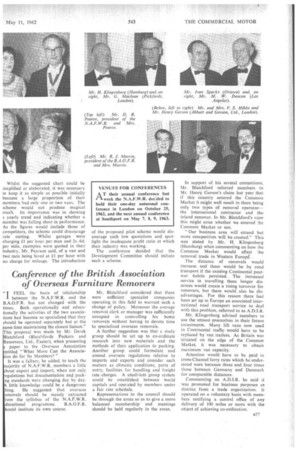Conference of the British Associatton of Overseas Furniture Removers
Page 53

If you've noticed an error in this article please click here to report it so we can fix it.
“
I FEEL the basis of relationship between the N.A.F.W.R. and the B.A.O.F.R. has not Changed with the times. Both operationally and educationally the activities of the two associations had become so specialized that they should be operated separately but at the ame time maintaining the closest liaison." his proposal was made by Mr. Derek latchford (Blatchfords Packers and emovers, Ltd., Exeter), when presenting paper to the Overseas Association Milled_ " What More Can the Associaion do for Its Members?"
It was a fallacy, he added, to teach the ajority of N.A.F.W.R. members a little bout export and import, when not only egulations but documentation and packng standards were changing day by day. little knowledge could be a dangerous hing. He suggested that overseas emovals should be mainly extracted TOM the syllabus of the N.A.F.W.R. ducational programme. B.A.O.F.R, ould institute its own course.
Mr. Blatchford considered that there were sufficient specialist companies operating in this field to warrant such a change of policy. Moreover the average removal clerk or manager was sufficiently occupied in controlling his home removals without having to devote time to specialized overseas removals.
A further suggestion was that a study group should be set up to co-ordinate research into new materials and the methods of their application to packing. Another group could formulate and amend overseas regulations relative to imports and exports and consider such matters as climatic conditions, ports of entry, facilities for handling and freight rate charges. A small-lots group system could be established between world capitals and operated by members under a fair rate schedule.
Representations to the council should be through the areas so as to give a more balanced membership• and meetings should be held regularly in the areas.
In support of his several contentions, Mr. Blatchford referred members to Mr. Henry Gerson's claim last year that if this country entered the Common Market it might well result in there being only two types of removal operator— the international contractor and the inland remover. In Mr. Blatchford's view this might arise whether we entered the Common Market or not.
" Our business area will extend but more competition will be created." This was stated by Mr. H. •Klingenberg (Hamburg) when commenting on how the Common Market would affect the removal trade in Western Europe, , The distance of removals would increase, and these would be by road transport if the existing Continental postwar habits persisted. The increased service in travelling these longer tances would create a rising turnover for removers, but there would_ also be disadvantages. For this reason there had been set up in Europe an'associated international road transport service to deal with this problem, referred to as A.D.I.R.
Mr. Klingenberg advised members to use the utmost precaution in their future investments. Many lift vans now used in Continental traffic would have to be replaced by van trailers. As Britain was situated on the edge of the Common Market, it was necessary to obtain maximum van capacity.
Attention would have to be paid to cross-Channel ferry rates which he understood were between three and four times those between Germany and Denmark for comparable distances.
Commenting on A.D.I.R. he said it was promoted for business purposes as distinct from a trade organization. It operated on a voluntary basis with members notifying a central office of any delivery of 100 miles or more with the object of achieving co-ordination.




































































































